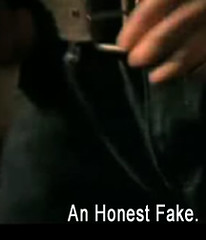The ad features two teens that practice how long it takes to get dressed and undressed before “going down to the basement to watch TV.” Um, sure they are.
The racy spot is creative, connects with the target, and works. The only problem is that the advertisement (which has since gone viral) does not consider the client’s brand nor was it ever approved. Worse, it seems, J.C. Penney doesn’t want any association with the ad since it was criticized for promoting high school students having sex (which is always more scrutinized than other endeavors).
Statement From J.C. Penney
"J.C. Penney was deeply disappointed to learn that our name and logo were used in the creation and distribution of a commercial that was submitted to the 2008 International Advertising Festival at Cannes. No one at J.C. Penney was aware of the ad or participated in the creation of it in any way.
The commercial was never broadcast, but rather was created by a former employee at J.C. Penney's advertising agency, Saatchi & Saatchi, solely as an award submission without J.C. Penney's knowledge or prior approval.
J.C. Penney does not approve or condone its content, and we have asked Saatchi & Saatchi to remove the ad from online circulation and to apologize to our customers and our associates for misrepresenting our company in this manner.”
More Fallout From Saatchi & Saatchi
Saatchi & Saatchi immediately confirmed the statement and added that it had no knowledge that the advertisement was submitted, placing full blame on Epoch Films, a third-party production company. However, former Chief Operating Officer Tony Granger, who is now global creative head of WPP Group's Y&R, told AdAge a different story, saying that it was created for an award submission.
Epoch Films and J.C.. Penny are now referring all further inquires to Saatchi & Saatchi. Epoch Films has requested to withdraw the entry.
Final Thoughts
There are many folks in the advertising industry that covet awards (we have more programs than the entertainment industry) because advertising sometimes blurs the lines between commercial and entertainment. However, the real measure of effective advertising remains with the response.
Sure, the second measure, only after the first has been met, might be entering various award programs. But for me at least, the real beauty of the work isn’t just about making a magical commercial — it’s about matching the magic with the brand and having the client approve it. Otherwise, it’s petty easy to be blatantly creative.
In short, receiving recognition for the “honest” spot that never ran wasn’t worth it. And, one might wonder about J.C. Penney and Saatchi & Saatchi. They’ve both earned ample exposure, placing full blame on the smallest vendor to take the fall for releasing one of those nifty ideas that was unfortunately destined for the cutting room floor.



















2 comments:
Sounds rather genius to me.
Put out an Ad – controversial – yet with that youthful sensual appeal as proven effective by Klein ads. And then denounce it.
You win both markets
And, well the contreversy probably isnt going to hurt neither Satchi and Satchi nor (what was it? Pennies? - perhaps the producers.
Anyhow I was just joking - but in all honesty it seems rather innocent.
Hey Kevin,
I agree the ad seems innocent enough. The brouhaha seems have to do with the tag line.
As for entries ... the general rule of thumb is that a subcontractor should never submit an entry without agency permission.
And, award entrants should never submit unaired work unless the category is specifically allows for it.
You'd be surprised how seriously the industry take award competitions. :) Not saying they need to. It's just a fact.
Best,
Rich
Post a Comment